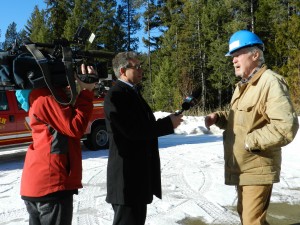Groundwater is a resource vulnerable to over‐exploitation. While depletion of surface water is seen easily with the public eye, groundwater depletion is invisible. Water managers need tools to understand the health of aquifers and to make evidence‐based decisions.
One such tool for monitoring groundwater is the BC Observation Well Network operated by the BC Ministry of Environment. This network supports management, protection and sustainability of our groundwater resource and associated ecosystems in British Columbia.
- Long-term trends in groundwater levels in BC (click to explore interactive charts on Environmental Reporting BC)
A major review of the BC Observation Well Network was completed in 2009 to identify gaps in the monitoring network. Another Okanagan specific survey of groundwater resources was conducted as part of the Okanagan Water Supply and Demand Study: Phase Two.
These two reports were summarized by BC Ministry of Environment staff and it was recommended:
That expansion of the network be targeted to those [identified] priority aquifers in the next 3 years where it is anticipated that observation well data will be needed to support water management decision making and local water services planning.
This became the foundation on which the Okanagan Groundwater Monitoring Project was established. The project is a collaborative effort involving local, federal and provincial governments.

The Okanagan Groundwater Monitoring Project is managed by the OBWB, which acts as a funding partner. Additional local funding is provided by individual municipalities and regional districts for wells within their jurisdictions.
The Province of BC, through the Ministry of Environment and the Ministry of Forests, Lands and Natural Resources Operations, contributes major in‐kind support by providing hydrogeological expertise, providing access to Crown lands for well‐siting, equipping observation wells and maintaining the on‐going remote monitoring programs.
The Government of Canada participates as a major funding partner, through Agriculture and Agri‐Food Canada (AAFC), and with in‐kind support through core‐logging by Environment Canada.
